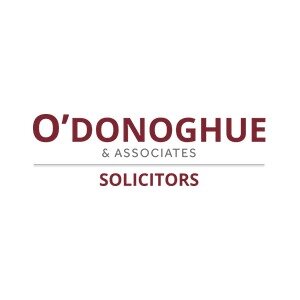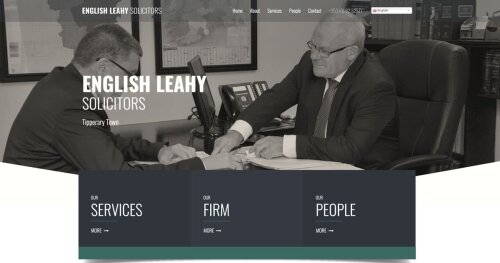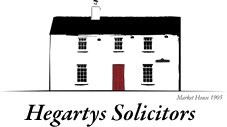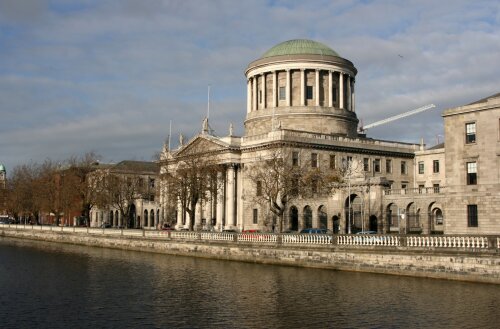Best Elder Abuse Law Lawyers in Ireland
Share your needs with us, get contacted by law firms.
Free. Takes 2 min.
Or refine your search by selecting a city:
List of the best lawyers in Ireland
About Elder Abuse Law in Ireland
Elder abuse in Ireland encompasses various forms of harm or distress inflicted on older adults, often by people they trust. Irish law recognizes the rights of older individuals to be protected from abuse, whether it's physical, emotional, financial, or neglect. In response, Ireland has implemented several legislative measures aimed at safeguarding vulnerable elderly individuals. Elder abuse law in Ireland primarily aims to ensure the well-being, dignity, and safety of older people. Legal provisions related to elder abuse are generally enforced through civil laws, criminal laws, and social services regulations.
Why You May Need a Lawyer
Legal intervention may be necessary in several scenarios involving elder abuse. These can include:
- Suspected financial exploitation of an elderly person, such as fraudulent claims on their property or unauthorized access to their bank accounts.
- Allegations of physical or emotional abuse by caregivers, family members, or others.
- Cases of neglect where the basic needs of an older person are not being met.
- Disputes over wills or estate management that imply manipulation or coercion.
- Seeking guardianship or power of attorney to protect an older individual's interests.
In such situations, a lawyer specializing in elder abuse can provide vital guidance, representation, and advocacy to safeguard the rights and well-being of the affected elderly individual.
Local Laws Overview
Several key aspects of local laws pertain particularly to elder abuse in Ireland, including:
- Adult Safeguarding: The Health Service Executive (HSE) has protocols for the safeguarding of vulnerable adults. Social workers and other professionals have a duty to report any suspicions of abuse to safeguard teams.
- The Non-Fatal Offences Against the Person Act 1997: This act criminalizes acts of assault, threats, and force, which can be relevant in cases of physical abuse.
- Domestic Violence Acts: These acts provide protective measures for elderly individuals in domestic situations experiencing abuse or threats.
- Assisted Decision-Making (Capacity) Act 2015: This legislation focuses on supporting decision-making for those who may struggle to make decisions independently, which is crucial for elder persons with cognitive impairments.
These laws collectively aim to protect the elderly population, ensuring they live without fear of any form of abuse.
Frequently Asked Questions
1. What constitutes elder abuse?
Elder abuse includes physical harm, emotional distress, financial exploitation, and neglect of basic care needs. It's any action or inaction that causes harm or distress to an older person.
2. How can I report suspected elder abuse?
Suspected elder abuse can be reported to HSE safeguarding teams, local Gardai (police), or social services. Professionals are encouraged to report through official channels.
3. What legal protections are available for victims of elder abuse?
Victims of elder abuse in Ireland have various protections, including restraining orders under domestic violence legislation, criminal charges against perpetrators, and support from social services.
4. Can financial institutions help protect against elder financial abuse?
Yes, banks and other financial institutions have roles in identifying and preventing financial abuse by monitoring for suspicious activities and implementing measures to protect account holders.
5. What role does the family play in preventing elder abuse?
The family plays a critical role in monitoring the well-being of elderly members, providing necessary care, and intervening or reporting when abuse is suspected.
6. How does the law define 'capacity' concerning elder decision-making?
‘Capacity’ refers to an individual's ability to make informed decisions. The Assisted Decision-Making (Capacity) Act 2015 outlines support structures for individuals whose decision-making capacity may be impaired.
7. Can an elder law attorney help with drafting wills and trusts?
Yes, elder law attorneys assist with estate planning, ensuring that the legal documents reflect the true intentions of the individual while safeguarding against undue influence or coercion.
8. What are the penalties for elder abuse in Ireland?
The penalties for elder abuse vary depending on the severity of the abuse and applicable laws. They can range from fines and restraining orders to imprisonment for serious offenses.
9. Are there any government-supported services for elder abuse victims?
Yes, services are available through HSE safeguarding teams, public health nurses, social work departments, and various nonprofit organizations that provide support and counseling.
10. How important is it to seek legal advice early in suspected cases of elder abuse?
Seeking legal advice early is crucial to protect the elderly person's rights, prevent further abuse, and ensure appropriate legal and supportive measures are implemented promptly.
Additional Resources
For further assistance, consider reaching out to the following resources:
- Health Service Executive (HSE): Offers guidelines and resources for dealing with elder abuse.
- SAGE Advocacy: An advocacy group supporting older people and adults who may be vulnerable.
- ALONE: Provides support services for older adults, including advice and advocacy.
- Citizens Information: Offers comprehensive details on rights and services available to seniors in Ireland.
Next Steps
If you suspect elder abuse or need assistance, taking the following steps can be critical:
- Contact an attorney specializing in elder law for legal advice and representation.
- Report the suspected abuse to the local authorities or HSE safeguarding teams.
- Engage with local community support services and advocacy organizations for additional guidance and support.
- Consider educational resources to understand signs of abuse better and Legal Protection Options.
- Explore guardianship or supportive decision-making frameworks if mental capacity issues are involved.
Understanding and taking prompt action can have significant benefits in protecting the rights and dignity of older adults.
Lawzana helps you find the best lawyers and law firms in Ireland through a curated and pre-screened list of qualified legal professionals. Our platform offers rankings and detailed profiles of attorneys and law firms, allowing you to compare based on practice areas, including Elder Abuse Law, experience, and client feedback.
Each profile includes a description of the firm's areas of practice, client reviews, team members and partners, year of establishment, spoken languages, office locations, contact information, social media presence, and any published articles or resources. Most firms on our platform speak English and are experienced in both local and international legal matters.
Get a quote from top-rated law firms in Ireland — quickly, securely, and without unnecessary hassle.
Disclaimer:
The information provided on this page is for general informational purposes only and does not constitute legal advice. While we strive to ensure the accuracy and relevance of the content, legal information may change over time, and interpretations of the law can vary. You should always consult with a qualified legal professional for advice specific to your situation.
We disclaim all liability for actions taken or not taken based on the content of this page. If you believe any information is incorrect or outdated, please contact us, and we will review and update it where appropriate.
Browse elder abuse law law firms by city in Ireland
Refine your search by selecting a city.
















